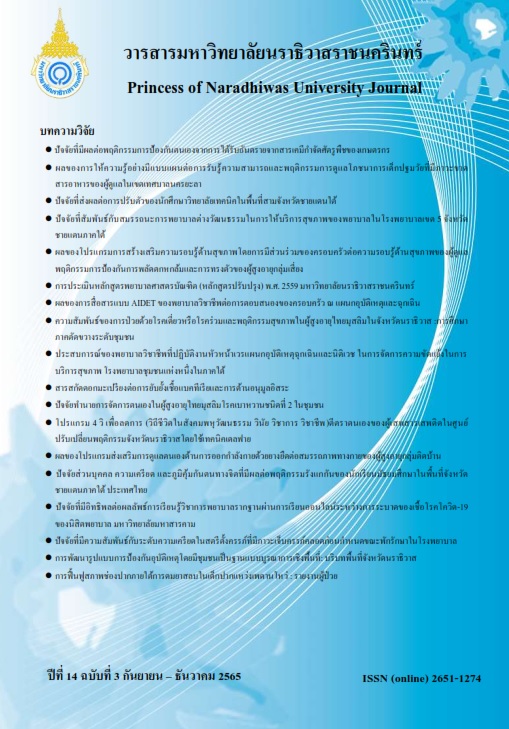Factors Related to Stress Level in Pregnant Women with Preterm Labor while Staying in Hospital
Keywords:
Pregnant women, Stress level, Preterm laborAbstract
Premature labor is a condition that affects both of the body and mind of pregnant women. This research aimed to study stress levels and factors affecting stress levels in pregnant women with preterm labor in hospital. The sample group was a total of 79 pregnant women who were admitted to the hospital from experiencing in preterm labor sign. The research instruments were a personal data questionnaire and the stress level test in pregnant women. The data were analyzed using percentage, mean, standard deviation, chi-square, and multiple regression stepwise analysis.
The results showed that overall stress among pregnant women was moderate.The most stressful aspect was in terms of health conditions of oneself and the fetal conditions (x̅ = 2.60, S.D. =.79). In addition, it was found that the gravida of pregnancy, maternity history and number of living child were statistically significant with the stress level in the pregnant women. It was found that the order of pregnancy was able to predict the stress level of 17.2%.
Nurses should focus on the approaching and reducing of stressors in women with preterm labor while staying in hospital, especially the primigravid women. Additionally, information regarding health status in pregnant women and their fetal should also be provided properly. Thus, enhancing appropriate guidelines should be implemented in order to reduce complication and prevent preterm birth in this group of women.
References
Cardwell, M.S. (2013). Stress: pregnancy considerations. Obstetrical & Gynecological Survey, 68(2), 119-129.
Cohen, J., Cohen, P., West, S., & Aiken, L. (2003). Applied multiple regression/correlation analysis for Behavioral sciences. (3rd ed.) London: Lawrence Erlbaum associates.
Giurgescu, C., & Misra, D.P. (2018). Psychosocial factors and preterm birth among black mothers and fathers. MCN: The American Journal of Maternal/Child Nursing, 43(5), 245-251.
Hanko, C., Bittner, A., Junge-Hoffmeister, J., Mogwitz, S., Nitzsche, K., & Weidner, K. (2020). Course of mental health and mother–infant bonding in hospitalized women with threatened preterm birth. Archives of Gynecology and Obstetrics, 301(1), 119-128.
Jafari, E., Mohebbi, P., & Mazloomzadeh, S. (2017). Factors related to women's childbirth Satisfaction in physiologic and routine childbirth groups. Iranian Journal of Nursing and Midwifery Research, 22(3), 219.
Omran, S.H., & Al-Khazraji, L.A. (2022). Evaluation of Primigravida Pregnant Women Perceived Stress during Second Trimester of Pregnancy. Pakistan Journal of Medical & Health Sciences, 16(03), 819-819.
Maloni, J.A. (2011). Lack of evidence for prescription of antepartum bed rest. Expert review of obstetrics & gynecology, 6(4), 385-393.
Nakanakupt, M., Kanungbutr, P., & Noykerd, I. (2018). Relationship between perceptions of Intrapartum care process, childbirth experience perception and satisfaction with nursing care among parturients. Nursing Journal, 45(1), 50-61.
Pokras, S., Pimenta, J., Merinopoulou, E., & Lambrelli, D. (2018). Short and long-term costs among women experiencing preterm labour or preterm birth: the German experience. BMC Pregnancy and Childbirth, 18(1), 1-14.
Pongporasuwan, S. (2014). The effect of family communication on stress in pregnant women with preterm labor hospitalized. Master of Nursing Science Thesis Advanced Midwifery Program Khon Kaen University. (in Thai)
Raburee, C., & Sornchai, S. (2015). Factors related to holistic health among mothers undergone Electronic Fetal Monitoring during the first stage of labor. Nursing Journal of The Ministry of Public Health, 24(2), 105-116.
Thanh, B.Y.L., Pattanittum, P., Laopaiboon, M., & Lumbiganon, P. (2018). Mode of delivery and pregnancy outcomes in preterm birth. KKU Research Journal (Graduate Studies), 18(4), 91-101.
Tuksanawes, P., Kaewkiattikun, K., & Kerdcharoen, N. (2020). Prevalence and Associated Factors of Antenatal Depressive Symptoms in Pregnant Women Living in an Urban Area of Thailand. International Journal of Women's Health, 12, 849.
Van Zijl, M.D., Koullali, B., Mol, B.W., Pajkrt, E., & Oudijk, M.A. (2016). Prevention of preterm delivery: current challenges and future prospects. International Journal of Women's Health, 8, 633.
Vogel, J.P., Oladapo, O.T., Manu, A., Gülmezoglu, A.M., & Bahl, R. (2015). New WHO recommendations to improve the outcomes of preterm birth. The Lancet Global Health, 3(10), e589-e590.
White, M., & Ritchie, J. (1984). Psychological stressors in antepartum hospitalization: Reports from pregnant women. Maternal-Child Nursing Journal, 13(1), 47-56.
World Health Organization. (2017). WHO recommendations on maternal health: guidelines approved by the WHO Guidelines Review Committee (No. WHO/MCA/17.10). World Health Organization.
Additional Files
Published
How to Cite
Issue
Section
License
Copyright (c) 2022 Princess of Naradhiwas University Journal

This work is licensed under a Creative Commons Attribution-NonCommercial-NoDerivatives 4.0 International License.




